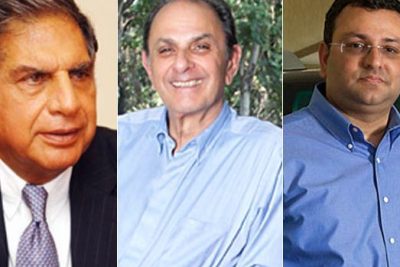Instead of getting any better, the Tata Sons story seems to be taking a deep dive. With Nusli Wadia who has been a friend of the family and an independent director with Tata companies for 4 decades threatening Tata Sons with libel, the Tata company reputation just moved down another notch in the long drawn out corporate war between the Tata companies and its independent directors.

The additional information released yesterday by Mr Mistry, that Mr Ratan Tata had once planned to sell TCS, the jewel in the Tata crown to IBM affected the reputation of Mr Tata even further. Not only has the ongoing boardroom war affected the company, but it is increasingly embarrassing the Parsi community who are known to be the most honest, kind and hospitable, gentlemanly people around and unfortunately diminishing in large numbers. Wadia has warned Tata Sons that he might initiate civil and criminal proceedings if it did not withdraw the notice against him and failed to prove its allegations against him. Many organisations consider their greatest asset to be their good name or reputation. The main benefits of a good corporate reputation are:
- Customer preference in doing business with your company when other companies’ products and services are available at a similar cost and quality
- The company's ability to charge a premium for products and services
- Stakeholder support for the organisation in times of controversy
- The organisation’s value in the financial marketplace
Although reputation is a fairly intangible concept, research shows that a good reputation increases corporate worth and provides a sustained competitive advantage. A US survey by Burson-Marsteller found that 95% of chief executives surveyed believed that corporate reputation plays an important or very important role in the achievement of business objectives. But only 19% had a formal system in place to measure the value of their corporate reputation.
A US study showed that there are ten main components of corporate reputation used in reputation measurement systems such as “the most admired companies in America”:
- Ethical: the organisation behaves ethically, is admirable, is worthy of respect, is trustworthy.
- Employees/workplace: the organisation has talented employees, treats its people well, is an appealing workplace.
- Financial performance: the organisation is financially strong, has a record of profitability, has growth prospects.
- Leadership: the organisation is a leader rather than a follower, is innovative.
- Management: the organisation is well managed, has high-quality management, has a clear vision for the future.
- Social responsibility: the organisation recognises social responsibilities, supports good causes.
- Customer focus: the organisation cares about customers, is strongly committed to customers.
- Quality: the organisation offers high-quality products and services.
- Reliability: the organisation stands behind its products & services, provides consistent service.
- Emotional appeal: It is an organisation I feel good about, is kind, is fun.

The Tata reputation may have been affected on the following parameters although it is difficult to quantify the effect except for their performance on the stock market. Tata companies lost Rs 21,000 crores ( $3070 m) in market capitalisation 2 days after Mr Mistry was ousted. ( 1 crore = 10 million )
Ethical behaviour : People largely believe that Cyrus Mistry was removed from the organisation without fair notice and in spite of an outstanding evaluation from his boards.
Financial performance : While the incident may not have an effect on financial performance, the Tata stocks seem to have taken a beating on the courses.
Leadership : People are questioning the bad succession management practices and therefore the leadership of the company. Since the Mistry ouster has divided the boards of the Tata companies, it shows the leadership as brittle and disunited.
Reliability : The honest, straight, upright image of the Tatas seem to have taken a fairly severe beating.
Emotional Appeal : Certainly it is losing its values of kindness, straight-forwardness and honesty that it has held for over a century
The famous Warren Buffet once said "It takes 20 years to build a reputation and 5 minutes to ruin it. If you think about that you will do things differently". In the case of the Tatas unfortunately, it took over a 100 years to build that impeccable reputation.
Obviously Tata Sons were unprepared for the kind of backlash that the Cyrus Mistry ouster would create. They seem to have not looked at the consequences; not predicted all the possible scenarios and outcomes in the aftermath, and the moves that they would need to make to protect their interests. It does seem like a pity to see such an old trusted brand lose its sheen in a fairly dirty corporate battle.
-------------
About the Author:
Prabhakar Mundkur is an ad veteran with over 35 years of experience in Advertising and Marketing. He works as an independent consultant and is also Chief Mentor with Percept H. All previous posts of Prabhakar can be found
here.



